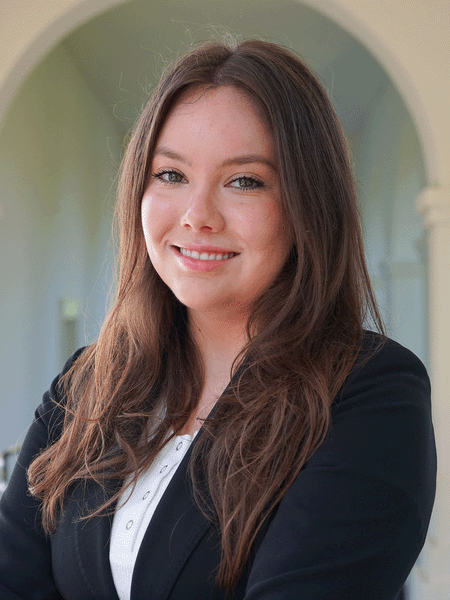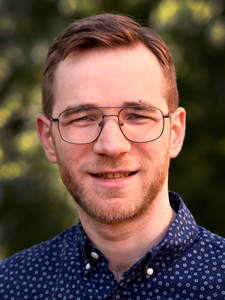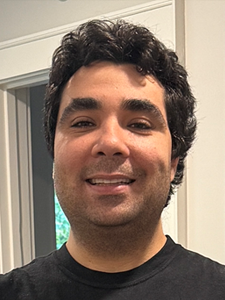Jeffrey M. Sturek, MD, PhD
 PRIMARY APPOINTMENT:
PRIMARY APPOINTMENT:
Department of Medicine, Division of Pulmonary and Critical Care
Secondary appointments: Departments of Pharmacology and Biomedical Engineering
CONTACT:
UVA Division of Pulmonary and Critical Care
PO Box 800546
Charlottesville, VA 22908
Email: JMS3HK@uvahealth.org
EDUCATION AND TRAINING:
- BA, Augustana College, Rock Island, IL
- MS, University of Virginia Graduate School of Arts and Sciences, Charlottesville, VA, Internal Medicine
- PhD, University of Virginia Graduate School of Arts and Sciences, Charlottesville, VA
- MD, University of Virginia School of Medicine, Charlottesville, VA
- Residency, University of Virginia Health System, Charlottesville, VA
- Chief Residency, University of Virginia Health System, Charlottesville, VA
- Fellowship, University of Virginia Health System, Charlottesville, VA
RESEARCH
Summary: The overall goal of our laboratory is to perform translational studies to improve our understanding of interstitial and inflammatory lung diseases and discover novel therapeutic targets. Our work spans the range of the translational research spectrum from clinical to basic laboratory work. We utilize both mechanistic studies in murine models of disease as well as complementary discovery-based translational studies in humans to bridge the critical gap between basic science and clinical medicine. Our specific focus is on the interaction between B lymphocytes, antibodies, and resident lung stromal cells in lung injury and repair. Methods used include high-dimensional immunophenotyping by mass cytometry as well as conventional animal disease models, tissue culture, ELISA, ELISpot, and molecular biology. Diseases of interest include interstitial lung disease, acute lung injury, immune checkpoint inhibitor pneumonitis, SARS-CoV-2 infection, and post-stem cell transplant graft-versus-host disease.
Active:
- Title: The Role of B-1 Cells and IgM in Pulmonary Fibrosis Pathogenesis, Pulmonary Fibrosis Foundation,
PI: Sturek JM, 10/01/2024 – 9/30/2026
- Title: Oxidation-Specific Epitope IgA in Pulmonary Fibrosis, NIH NHLBI, 1R01HL179312, PI: Sturek JM, 8/1/2025 – 5/31/2030
Pending:
- Title: The Role of B-1 Cells and IgM in Pulmonary Fibrosis, NIH NHLBI, 1R01HL176746, PI: Sturek JM, 12/1/2025 – 11/30/2030
Oxidation-Specific Epitope IgA in Pulmonary Fibrosis
Idiopathic pulmonary fibrosis (IPF) is a progressive scarring lung disease with high mortality and limited treatment options. We have identified novel circulating IgA antibodies against oxidation-specific epitopes (IgAOSE), which are significantly elevated in patients with IPF and positively correlate with disease severity. Using high-dimensional immunophenotyping by mass cytometry (CyTOF), we also identified a novel B cell subset that correlates with IgAOSE levels. Interestingly, this subset resembles double negative 2 (DN2) B cells and bears markers indicative of lung homing (CXCR3) and autoreactivity (IL21r). Our overall hypothesis is that lung injury drives local secretion of IgAOSE and that this propagates fibrosis through a positive feedback cycle. Ongoing work is testing this hypothesis through human studies in large independent cohorts, human lungs, and gain-and loss-of-function in murine models.
The Role of B-1 Cells and IgM in Pulmonary Fibrosis and Lung Injury
B-1 cells are an innate B cell population that produces natural IgM. These natural IgM recognize epitopes common to both pathogens and damaged self, including oxidized lipids referred to as oxidation-specific epitopes (OSEs). We have found that B-1 cells are recruited to the lung during injury, where they secrete IgM, including IgM to OSE (IgMOSE), and protect against the development of fibrosis. Our overall hypothesis is that B-1 cells protect against fibrosis through recruitment to the lung and local production of IgMOSE and complement activation. Ongoing work is testing this hypothesis through mechanistic studies in mice studying trafficking of pleural B-1 cells to the lung in bleomycin-induced lung injury, gain-and loss-of-function studies with spatial quantification of fibrosis, and analysis of human lung tissue evaluating a functional ortholog of B-1 cells.
Pulmonary complications after hematopoietic stem cell transplant (HSCT)
Allogeneic hematopoietic stem cell transplants (HSCT) are used to treat a wide range of hematologic disorders. As advances have been made in HSCT management, chronic graft-versus-host disease (cGVHD) has emerged as an increasingly common and therapy-limiting complication. cGVHD is a complex multiorgan disease characterized by proinflammatory and profibrotic immune dysregulation. Pulmonary GVHD is an important type of GVHD and has a wide range of pathologies, from airway obstruction to interstitial disease and pleural effusions. Following HSCT, the development of pleural effusions is common and associated with worse overall survival. The etiologies of post-HSCT pleural effusions include infection, malignancy, volume overload, and serositis-type GVHD. Serositis is a less common and largely uncharacterized manifestation of cGVHD presenting as one or a combination of pleural effusions, pericardial effusions, and ascites. We are employing a multifaceted approach, including clinical, proteomic, and cytometry analyses, to understand the mechanisms of driving serositis-type GVHD pleural effusions as well as other pulmonary complications of HSCT.
Novel Tool Development and Bioengineering Approaches in Immunity of Lung Fibrosis
Understanding the underlying mechanisms of lung injury and repair requires new tools to measure and test cellular interactions with the tissue environment. Ongoing efforts in the lab are directed to the development of such novel tools through collaborations with colleagues in biomedical engineering, including spatial quantification of fibrosis, high-dimensional immunophenotyping and imaging, and biomaterials.
CURRENT LABORATORY MEMBERS

 Dr. Jeffrey Sturek is a physician-scientist with a research program focused on translational pulmonary immunology. He received formal research training through the NIH Medical Scientist Training Program (MD/PhD). He completed a clinical residency and chief residency in Internal Medicine, followed by a fellowship in Pulmonary and Critical Care Medicine. During the research phase of his fellowship, Dr. Sturek trained with Dr. Coleen McNamara, gaining experience in B-cell immunology and translational research methods, including mass cytometry. In 2019, he was selected as an invited scholar in the Integrated Translational Health Research Institute of Virginia (iTHRIV) Scholars Program, a structured, two-year career development program designed to foster the development of early-career translational health researchers. Dr. Sturek’s work spans the range of translational research, from clinical to basic laboratory work. He utilizes both mechanistic studies in murine models of disease and complementary discovery-based translational studies in humans to bridge the critical gap between basic science and clinical medicine.
Dr. Jeffrey Sturek is a physician-scientist with a research program focused on translational pulmonary immunology. He received formal research training through the NIH Medical Scientist Training Program (MD/PhD). He completed a clinical residency and chief residency in Internal Medicine, followed by a fellowship in Pulmonary and Critical Care Medicine. During the research phase of his fellowship, Dr. Sturek trained with Dr. Coleen McNamara, gaining experience in B-cell immunology and translational research methods, including mass cytometry. In 2019, he was selected as an invited scholar in the Integrated Translational Health Research Institute of Virginia (iTHRIV) Scholars Program, a structured, two-year career development program designed to foster the development of early-career translational health researchers. Dr. Sturek’s work spans the range of translational research, from clinical to basic laboratory work. He utilizes both mechanistic studies in murine models of disease and complementary discovery-based translational studies in humans to bridge the critical gap between basic science and clinical medicine.
As a dual-trained physician-scientist, Dr. Sturek feels it is his calling to work at the translational interface and to train the next generation of physician-scientists. He currently serves as the Director of the Physician Scientist Training Program (PSTP) at UVA, a research training program for Department of Medicine residents and fellows, and as an Associate Director of the Medical Scientist Training (MD/PhD) Program.
Dr. Sturek’s work has been published in high-impact journals, including The Journal of the American Medical Association, The New England Journal of Medicine, Nature, Nature Immunology, Science Immunology, and The Journal of Clinical Investigation. On the clinical research end of the spectrum, he co-directs a clinical trials group, the Joint Emerging Diseases Initiative (JEDI), with his colleague Dr. Patrick Jackson from the Division of Infectious Diseases. Together, they bring up both multi-site NIH and local investigator-initiated clinical trials. Dr. Sturek’s basic translational research laboratory focuses on the interactions between B cells, antibodies, and lung-resident stromal cells in lung injury and repair.
Away from the laboratory, Dr. Sturek enjoys cooking, staying active outdoors, and spending time with his family, which includes his wife Jen, children Lily, Olsen, and Hank, and dogs Pearl and Po.
Statement of Mentoring Philosophy
Dr. Sturek is deeply committed to mentoring the next generation of scientists and physician-scientists. He employs a trainee-centered, process-oriented, gap-based approach to mentorship and career development, which is rooted in mutual respect and open communication. Scientific mentorship focuses on learning and practicing rigorous scientific method, designing hypothesis-driven experiments, considering proper controls and alternative approaches, high-dimensional data analysis, and data visualization. Career development is centered on building and cultivating a mentoring network, including peer and near-peer mentors, goal setting, establishing healthy writing habits and accountability, manuscript preparation, and grantmanship. He aims to lead by example while embracing the diversity of thoughts, backgrounds, and goals of each trainee. The ultimate mark of success of a mentoring relationship is the achievement of the trainee’s objectives and their advancement in a fulfilling career.
 Aditi Atreya, Undergraduate
Aditi Atreya, Undergraduate
Aditi Atreya is an undergraduate student pursuing a B.A. in Statistics and Public Health on the pre-med track. Her research interests include exploring the role of various B-cell subtypes in the pathogenesis of fibrosis. In her free time, she enjoys reading, painting, and spending time with family and friends.
 Kathryn Boerckel, Undergraduate
Kathryn Boerckel, Undergraduate
Kathryn Boerckel is an undergraduate pursuing a B.S. In Biology on the pre-med track. Her research interests include investigating the role of delayed IgM induction on fibrosis in the lungs, as well as the role of complement activation in tissue repair. In her free time, Kathryn enjoys going for walks and spending time with her family and friends.
 Riley Hannan, PhD, Postdoctoral Fellow
Riley Hannan, PhD, Postdoctoral Fellow
Riley Hannan received his PhD from UVA in 2021 and is continuing to study mechanisms of pulmonary fibrosis with the Sturek group, with a focus on crosstalk between fibrotic tissue and local/systemic B cell immunology. He can typically be found in a microscope in the dark. It is recommended to make plenty of noise when approaching Dr. Hannan to avoid a startle response. When not at the microscope, Dr. Hannan enjoys puzzling over flow data or soapboxing about scientific rigor within the perverse incentive structure of the academy. Outside the medical center, Riley can be found eating at local restaurants, playing or watching video games, and snuggling with his shadowy beasts.
 Heather M. Haughey, PhD, Clinical Research Manager
Heather M. Haughey, PhD, Clinical Research Manager
Heather graduated from S.U.N.Y. at Oswego in 1993 with a BS in Biology and a minor in Chemistry. She moved to Salt Lake City, Utah, and began her professional career at the Center for Human Toxicology at the University of Utah. She pursued a career as a basic scientist and earned a PhD in Neuropharmacology in 2000, focusing on drugs of abuse. She completed a postdoctoral fellowship on the pharmacology of alcohol craving and addiction at the University of Colorado Health Sciences in Denver, Colorado. She subsequently served as a research associate at the University of Boulder. While at U of Boulder, she received a career development grant from NIAAA to transition from basic sciences to human clinical trials, studying various aspects of drug abuse and addiction. Heather became a research assistant professor in the Department of Psychiatry and Neurobehavioral Sciences at UVA in 2009. As a junior faculty member, she managed clinical trials examining craving for alcohol, other drugs of abuse, and addiction. She was awarded an NIDA R01 to study medications for cannabis craving. In 2012, she left UVA and took a new research position at Denver Health. In 2016, she returned to UVA to join the Department of Neurology as the project director of an NIH-funded national multisite stroke trial. In 2020, she helped create and lead a new clinical trials enterprise, The Joint Emerging Diseases Initiative (the JEDI team), working closely with the Pulmonary and Infectious Disease faculty. In February 2021, Heather officially joined the Department of Pulmonary and Critical Care as the clinical research manager, overseeing administrative functions and coordinating research efforts for the JEDI team. Heather enjoys spending time with her son, mountain biking, skiing, cooking, entertaining, and wine tasting with family and friends in her free time.
 Deepika Kotay, Lab Specialist Senior
Deepika Kotay, Lab Specialist Senior
Deepika’s goal as a specialist/manager is to manage, support, and create a research environment for the creative team, and at the same time ensure quality and safety compliance. She has a desire to master new skills and incorporate them in both basic and translational research.
In her free time, she enjoys spending quality time with her family, watching movies, exploring local libraries, cooking, gardening, and loving everything artsy, supporting local and school communities.
 Pearl Raichura, Undergraduate
Pearl Raichura, Undergraduate
Pearl Raichura is an undergraduate pursuing a B.S. in Biology on the pre-med track. In her free time, she enjoys going on runs and spending time with friends and family. Currently, her research interests lie in investigating the role that oxidized lipids play in the propagation of fibrosis.
 Gordon Smilnak, MD, Internal Medicine Resident
Gordon Smilnak, MD, Internal Medicine Resident
Gordon Smilnak is a PGY-3 resident in internal medicine at UVA. Originally from Detroit, MI, he completed his undergraduate studies at Duke University and received his medical degree from Northwestern. He has a special interest in clinical research methods and is currently working with Dr. Sturek to explore the implications of race-neutral pulmonary function testing on risk prognostication for individuals undergoing hematopoietic stem cell transplant. Outside of UVA, he enjoys coffee, bar trivia, and completing (or not completing) the New York Times daily crossword.
WANT TO JOIN OUR TEAM?
Accepting students, postdoctoral fellows, and research scientists. Please email Dr. Sturek (jms3hk@uvahealth.org) to inquire.
PAST LABORATORY MEMBERS
 Dayton Barker, Undergraduate
Dayton Barker, Undergraduate
Dayton finished his degree in Biomedical Engineering at UVA in 2024 and is working at the United States Patent Office as an examiner. Soon, he intends to further explore his interest in medical devices and intellectual property with a legal education. In his free time, he enjoys cooking, exercising both at the gym and on the soccer field, and visiting friends in other cities.
 Rebecca Brown, MD, Internal Medicine Resident
Rebecca Brown, MD, Internal Medicine Resident
Brendan Cox, Undergraduate
 Andrew Gaines, Undergraduate
Andrew Gaines, Undergraduate
Andrew Gaines graduated from UVA in 2025 with a B.S. in Biomedical Engineering. He first developed his interest in scientific research and immunology in the Sturek lab, exploring the role of a scavenger protein in the pathogenesis of idiopathic pulmonary fibrosis. Andrew continued his journey in research as a postbac studying cancer stem cells in breast cancer and intends to continue his education as a PhD student in a biomedical science program. Outside of the lab, Andrew enjoys playing basketball and geeking out on movies and TV shows.
 Eva Otoupalova, MD, Postdoctoral Fellow
Eva Otoupalova, MD, Postdoctoral Fellow
Dr. Eva Otoupalova received her medical degree from Charles University in Prague. Following graduation, she trained in basic laboratory methods, studying mechanisms of fibroblast senescence at the University of Alabama (UAB). She then pursued a residency in Internal Medicine at Oakland University and returned to UAB as an Assistant Professor of Medicine, attending the Pulmonary and Ventilator weaning unit. She subsequently completed a 3-year fellowship at the University of Virginia, Division of Pulmonary and Critical Care. Her projects focus on investigating mechanisms of lung injury repair and lung fibrosis, as well as on the role of adaptive immune responses in severe forms of tuberculosis and tuberculosis sepsis.
 Frank Papik, MD, Pulmonary and Critical Care Fellow
Frank Papik, MD, Pulmonary and Critical Care Fellow
Frank Papik received his MD from Stony Brook University. Completed an internal medicine residency at Dartmouth Hitchcock Medical Center, followed by a Pulmonary/Critical Care fellowship at UVA. Frank participated in research studying serositis in stem cell transplant patients and contributed to building a database and collecting and processing fluid samples to be used for future research. He takes pride in the fact that during his tenure in the Sturek lab, he caused minimal damage to costly research equipment, and fortunately, no one was harmed as a result of his actions.
He now works in the community as a pulmonologist and intensivist.
Outside of work, Frank can be found at Cannibal Corpse concerts, chainsawing demons in video games, or pushing his sister’s pug around in a stroller because it will only walk for 10-15 minutes at a time before it just stops moving altogether.
